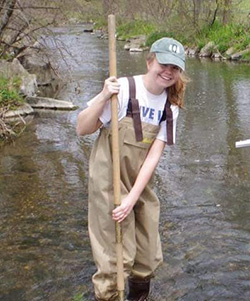Meet Sarah Stalcup

Degree: BA Environmental Studies and Sustainability + MS Environmental Policy ’19
Research Interests: Citizen science, environmental justice
Co-ops:
- Watershed Protection Program Co-op, Patrick Center for Environmental Research of the Academy of Natural Sciences
- Office Manager and Laboratory Technician, Delta County Mosquito Control District No. 1
- Curatorial Assistant, Department of Malacology of the Academy of Natural Sciences
Extracurricular activities: Drexel Naturalists Association
Awards: Outstanding Junior Award, Department of Biodiversity, Earth and Environmental Science, Intel International Science Fair Scholarship, Drexel University, Jane and John Bales Co-op award, A.J. Drexel Scholarship, Dean’s List
What kind of research are you interested in?
I am interested in the intersection of science and society, particularly as it relates to environmental justice. I am passionate about the environment and individuals’ rights to it, which plays a great role in how research is conducted and how policies are made. My master's research, which stemmed from my work with the Fair Trade Collective, is focused on community-led citizen science and its relation to expert communities through infrastructures such as peer review. From this research, I hope to learn more about the interactions between a dominantly professional practice, peer review and citizen science — more specifically, if traditional peer review is useful and confers status to citizen-science communities seeking change.
What motivates you?
As an environmentalist, something that motivates me is seeing others’ passion for the environment. In the environmental community, and specifically at Drexel, I have found a strong community of passionate people who are genuinely excited about what they do. This excitement has been contagious, and makes learning and collaborating on environmental problems some of the most rewarding and enjoyable experiences that I have had. Furthermore, creating positive change, large or small, is rewarding and motivating.
Tell us about your co-op experiences.
All three of my co-op experiences allowed me to explore my options outside of the classroom and helped me determine my academic path here at Drexel. My first co-op experience was in watershed protection at the Academy of Natural Sciences in the Patrick Center for Environmental Research. In this position, I conducted fieldwork and performed data analysis, even participating in research for a literature review paper.
For my second co-op, I returned to my hometown of Delta, Colorado, where I worked as a lab and field technician for my local mosquito control district. There, I was able to use my laboratory skills and knowledge of mosquito species to help prevent the spread of vector-borne diseases and provide the community with safe ways to prevent the rise of mosquito populations.
My final co-op was again with the Academy of Natural Sciences, this time in the Department of Malacology as a curatorial assistant. I worked directly with specimens and their history, and have since continued with this project part-time. What I have found most valuable about my co-ops has been the ability to work in the environmental field and see which positions pique my interest, helping me guide my job search as I approach graduation.
What has made your experience at Drexel special or unique?
Something that has set my experience apart has been the flexibility to make my time at Drexel my own. As a student interested in citizen science and environmental justice work, I looked at a lot of schools with environmental programs; Drexel stood out because it gave me the opportunity to mold my education into an applicable background for the work I want to do. Now that I am a senior, I can look back and see how many opportunities I have had — from co-op to master’s research and even individual classes — to make my college experience my own.
Why would you recommend the BEES department at Drexel?
Something that I love about Drexel's Environmental Studies and Sustainability program, and part of what drew me to it, is its social focus. I am passionate about the environment, but also about people, which has made this program a great fit for me. The program has a good balance of science, sustainability and social science courses, which has allowed me to connect themes across disciplines and look at the bigger picture of sustainability.
The BEES department has provided me not only with a number of research, learning and networking experiences over the years, but also with a community of people who are passionate about the same things as me. The program has been more than an academic department; it has been a supportive community. I have also found that the diverse interests of the professors and students involved have allowed me to find my own passions within the environmental field.
Additionally, Drexel offers students the opportunity to obtain both a graduate and an undergraduate degree. Because of this opportunity, I will be graduating with a Bachelor of Arts in Environmental Studies and Sustainability and a Master of Science in Environmental Policy. Not only has this provided me with a second degree, but it also has further diversified my academic experience here at Drexel.